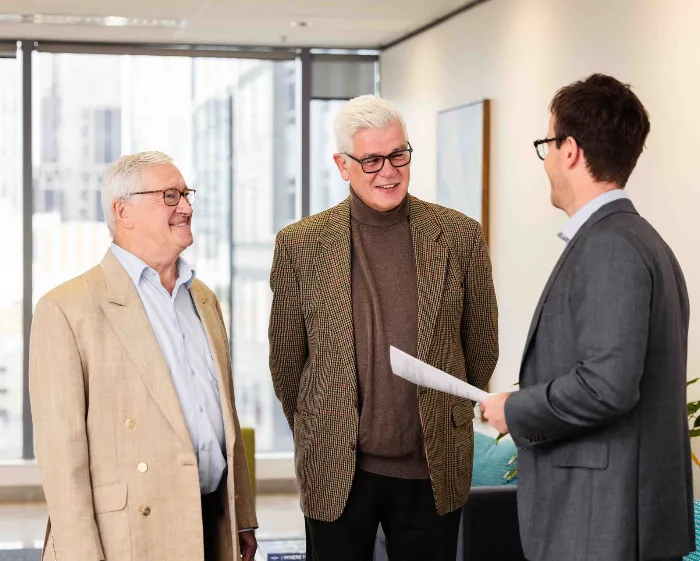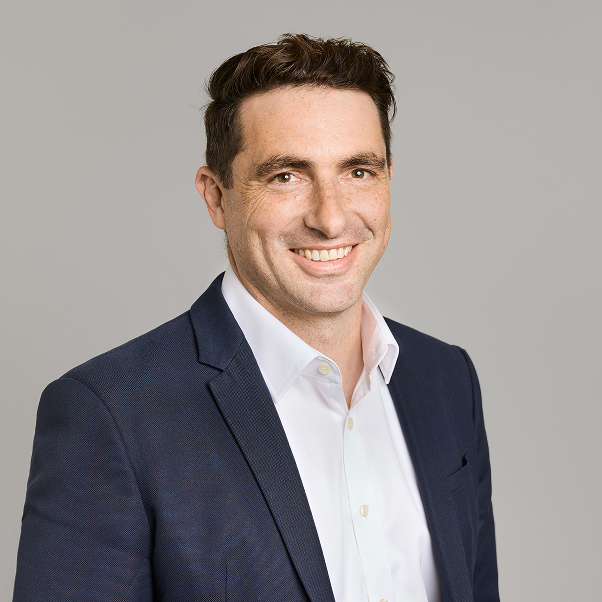Financial
Roadmap
A clear, personalised path to your financial goals.

For many, the act of giving quietly says more about their values than their wealth ever could.While generosity is often driven by personal convictions, it does not exist in isolation from financial systems.
Tax-efficient gifting and philanthropy offer a way to contribute meaningfully while also supporting long-term financial goals. The structure behind how and when you give can shape both the reach and the effect of that contribution.
At First Financial, we help clients with holistic retirement planning that includes doing good with their wealth. Questions often turn to the mechanics, such as what options exist, how they differ and what each might mean in practice.
Charitable giving is typically motivated by personal beliefs, community ties or the emotional connection one has to a particular cause, but it also has a place in financial planning. In Australia, donations to Deductible Gift Recipients (DGRs) may be claimed as tax deductions if they meet certain criteria. These deductions reduce your taxable income, rather than returning the value of the donation itself.
If giving is something you genuinely want to do and you’re in a position to do it, structuring donations over time can lead to more lasting outcomes than one-off contributions. Philanthropic structures such as private ancillary funds (PAFs), charitable trusts and bequests offer flexibility in how and when funds are distributed.
They can also provide opportunities to involve family in the decision-making process and help create a legacy that extends well beyond a single act of giving.
Non-cash giving, such as donating shares, property or other assets, can involve different tax implications compared to cash donations. These may include considerations like capital gains tax, valuation requirements and timing of ownership transfer. While gifts of this kind can be highly effective, they usually require additional steps to assess their suitability and compliance.
Rules around charitable giving can vary widely, and even small details may affect how different options might work for your personal circumstances. Speak with your adviser to make sure your approach is clear, deliberate and right for the way you want to give.
As mentioned, there are several vehicles that support long-term planning and purpose, including private ancillary funds (PAF). A PAF is a type of charitable trust set up by individuals or families that allows donors to receive an immediate tax deduction while distributing grants to charities over time.
They must distribute at least 5% of their assets each year to eligible charities or DGRs, and they are regulated by the Australian Taxation Office (ATO).
Testamentary charitable gifts are another common option. These donations are specified in a person’s will and made after their death.
They might be a specific amount, a percentage of the estate or a residual bequest. While they are not eligible for a tax deduction during the donor’s lifetime, they can reduce the size of the estate for tax and asset distribution purposes.
If you own a business, that entity may make tax-deductible donations directly to DGR-endorsed charities as part of its operating expenses. Some organisations establish corporate foundations to manage ongoing charitable activity, typically aligned with business values or community investment strategies. Giving through a business structure can also enhance employee engagement, strengthen brand reputation and support broader social impact.
The decision of whether to give charitably—and then how to give, and to whom—is deeply personal. Most people base this decision on their beliefs, life experiences that have shaped them, or connections to particular causes. When you give to an enduring mission like education or health, or support research into an illness that has affected your own family, you’re not just offering monetary help. You’re building a lasting legacy.
Philanthropy can also be a family affair. Including loved ones in these decisions is a meaningful way to pass on your values, encourage open conversations and nurture a shared spirit of generosity.
In the context of multi-generational wealth, bringing children or future beneficiaries into the process early can help carry your charitable focus forward. Structures like family foundations or advisory boards can provide a more formal framework for involvement, if that feels appropriate.
Not every approach to giving is equal when it comes to time and effort. A one-off donation is simple, but structured giving, such as setting up a fund or foundation, can involve legal requirements, ongoing administration and reporting. Thinking about how much involvement you want day-to-day can help you choose a path that feels both sustainable and worthwhile.
Earlier, we discussed tax deductibility, but what exactly makes a donation tax-deductible in Australia? It must be made to an organisation with DGR status, and it must be a genuine gift with no material benefit received in return—this is why things like raffle tickets or fundraising dinners don’t qualify. Minimum amounts apply, usually $2, and proper documentation, such as receipts, must be kept for tax purposes.
While cash is the most common form of donation, you can also gift shares, property or other assets to eligible organisations. Again, these kinds of gifts may trigger capital gains tax (CGT), depending on the asset type and whether it has increased in value.
Donating pre-CGT assets or using provisions like gifting listed shares held for over 12 months may offer additional tax advantages, but it’s important to seek professional advice before proceeding with such endeavours.
The timing of a donation determines which financial year the deduction applies to, with anything made after 30 June falling into the next financial year. To claim charitable gifts on your tax return, it’s important to keep clear records, particularly if you’re giving through a trust, foundation or business. The ATO offers specific guidance on how and when deductions can be claimed, and non-compliance may carry the risk of audit or penalties.
With EOFY 2025 fast approaching, now is a good time to reflect on your current and future plans for philanthropy and gifting.
While nothing beats the emotional reward of doing the right thing, if your plans are structured well, you might also receive a small financial thank you in the form of tax-effectiveness.
At First Financial, we can help incorporate your giving goals into a personalised financial plan that supports a confident retirement and ongoing contributions to the causes that matter to you.
To learn more about charitable giving, financial strategy or retirement planning, contact our team to speak with an experienced financial adviser.
Read more financial planning articles.
Every client journey begins with a conversation. We look closely at where you are now, what matters to you, and what’s possible. Then we structure our advice to match.
A clear, personalised path to your financial goals.
Proactive strategies to maximise your tax savings.
Tailored plans aligned with your goals and risk profile.
Regular guidance to keep your plan on track.
Retired and semi-retired
Referred by friends who were helped through aged care, Craig sought secure financial guidance after inheriting funds.
“We feel very secure with First Financial, the income just comes in, and we know everything is being looked after. It’s not just safe, it’s smart. We’ve recommended them to others because we genuinely believe in the team.”

Retired business owner
After decades of running a successful pharmacy, John sought financial guidance to simplify decision-making and support long-term planning.
“I feel genuinely supported by First Financial. I can ask anything, and there’s no pressure, just clear advice and real care. The money’s growing, I’m not stressed about it, and I feel completely at ease for the first time. I don’t miss work, but I’d miss the support I get from First Financial.”

Newly retired
As retirement neared, Larry and Virginia were ready to enjoy travel, family, and freedom, without uncertainty. A friend recommended First Financial, and from the first meeting, they had a clear plan, a safety net, and people they trusted.
“We’ve travelled the world, Europe, Sri Lanka, Vietnam, without once stressing about the money. They made everything feel simple and gave us the confidence to live well. We feel secure because we know exactly where we stand, and that peace of mind means everything.”

Retired
Jan's husband managed the finances until entering aged care. Jan gradually stepped into the financial picture with First Financial’s support.
“The money just comes in. I don’t have to think about it. And I know they’re always there. They’ve always been there in the background, just quietly making things work.”

Retired widow
Lyn stepped into financial management for the first time after her husband's passing. With patience and care, First Financial supported her through grief, learning, and empowerment.
“After my husband passed, I was completely unsure where to start. First Financial gave me the space to learn, to ask questions, to grow confident. They drew a diagram that I still have. And now, I sleep well at night knowing I’ve got someone in my corner.”

Early retirement and working professional
When Tim received an overseas medical settlement, he and Adam had just 14 days left in a 90-day window. They needed clear guidance, fast. A referral led them to First Financial.
“We’re in totally different life stages, but First Financial built a strategy that supports us both. From urgent legal steps to ethical investing, they handled every detail with calm, care, and real expertise. It’s financial freedom without compromise, and we couldn’t have done it without them.”








You can use the form below to make a general or initial enquiry.
You can also book a 15-minute call with an adviser by clicking the blue button below.
You can use the form on the right to make a general or initial enquiry.
You can also book a 15-minute call with an adviser by clicking the blue button below.
Fill in your details and briefly let us know how we can help.
We’ll reach out to schedule a time that suits you.
Enjoy an obligation-free initial meeting to discuss your goals and explore how we can guide you toward financial confidence.
Let’s start the conversation.
We look forward to hearing from you!
Level 9, 90 Collins Street,
Melbourne, VIC, 3000
Office Hours
Mon – Fri | 9:00 am – 5:00 pm